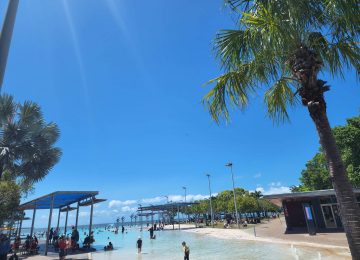Cairns Residents know to reach for the AC when outdoor humidity rises. But for all the relief an AC unit can bring you during times of peak heat, they aren’t immune to humidity either. Cairns has a tropical climate consisting of hot and humid Summers and mildly cooler Winters. According to the Bureau of Meteorology Cairns average annual rainfall is 1992mm on an average 154 days. Typical daytime min/max temperatures ranges are 23C/31C in mid-Summer and 18C/26C in mid-Winter.
Outdoor Humidity can affect your AC unit. If a cooling unit isn’t maintained correctly, you may find its effectiveness fade over time as it struggles to reach your desired temperatures. Read on below to learn how humidity impacts your AC unit and what you can do to protect it.
5 Ways Outdoor Humidity Can Affects Your AC Unit
1. Outdoor Humidity Forces Your AC to Work Harder
The most significant source of damage to air conditioners (and the largest reason people need to get their AC repaired) is high humidity exposure. The higher the temperature in your room or house, the more power your unit will use to reach your preferred temperature. As with any electronic device, an air conditioner has its limits, and the harder it has to work, the weaker it will become in time.
2. Cairns Outdoor Humidity causes Moisture to Build-Up
Your AC performs two jobs: it removes moisture from the air in your home and blows in air from outside that the unit refrigerates. Manufacturers have to design these machines to handle moisture, but too much can damage the system. Even worse, it can lead to mould and algae growth, potentially making someone in the home ill and further wreaking havoc on your system.
3. Outdoor Humidity can result in increased Utility Bills
The most noticeable consequence of an AC damaged by humidity is a spike in your average electricity bill’s cost. As the unit weakens, it will need to run longer to compensate.
Doing this is only prolonging the inevitable: once the strained system cannot regulate your home’s temperature correctly, merely leaving it running won’t fix the problem. You’ll only end up paying more in air conditioning costs per month to keep it running while harming the unit further.
4. Cairns Outdoor Humidity can create the perfect environment in your AC for Pests
Small animals and insects that prefer high temperatures love overworked electronics. An AC that struggles to regulate temperature will be hot on the inside, creating an ideal environment for pests. You may not think an uninvited guest like this is a big deal, but some pests can fry and destroy the AC’s circuit board, putting it out of commission for good.
5. Leaking Water Indoors
Modern air conditioning units feature an elaborate drainage system. In theory, this helps protect the device’s electric components and prevent the development of mould. However, high humidity can hasten the development of problems that drainage should prevent, causing water to back up and flood out of your AC. Specifically, outdoor humidity creates an ideal environment for mould to grow, which can affect your AC by block your drainage system.
How To Keep Your AC Unit In Working Order
You can’t control the humidity, but you can lessen its impact on your unit and HVAC system. The following steps are not only right for keeping your AC in working order on hot days, but they’re also excellent maintenance practices. Most of these steps need to be taken regularly on an on-going basis to be effective. Ultimately they will extend the life of your unit and save you money.
Wipe down the inside of your unit.
Regularly scheduled cleaning is the easiest way to stop mould from growing to dangerous levels. With most commercial AC units, you can access the inside by removing a few screws, with no special equipment required.
However, always be careful when wiping the inside of your AC. Be sure the unit is off, that you’re in a well-ventilated area, and that you wear protective goggles and gloves. Wipe the flat surfaces inside the unit with a cleaning agent that’s safe to use with air conditioners. Do this regularly to keep mould in check.
Clean (or Replace) Your Filter.
Your AC’s filter is in the front of the unit (that is, the side facing inside your home). Besides coming into contact with a lot of moisture, it catches impurities in the air like dirt before they get blown into your home.
Filters are usually easy to maintain: most only need to be passed through running water occasionally. However, you should always refer to the owner manual and follow the steps recommended by the manufacturer. The manual will also tell you when you need to replace your filter with a new one.
Downsize your Air Conditioner.
We often think that bigger is better when it comes to appliances, but that’s not the case with AC units. Manufacturers build them to be relative to the area they cool. A large air conditioner in a small home will consume more energy and activate more frequently as it detects temperature changes. Unless you’re cooling a commercial building, bigger isn’t necessarily the way to go.
Get Professional Air Conditioning Service Yearly
Some problems can be challenging to identify. Others are impossible to fix without specialized knowledge. That’s why you should call on Siv Air for air conditioning cleaning and aircon service in the Cairns area. Don’t let Cairns Outdoor Humidity affect your AC. Reach out to our friendly experts today to keep your AC costs low and keep your unit in top shape for those hot months!

![Cairns – Outdoor Humidity And How It Can Affect Your AC Unit Cairns Residents know to reach for the AC when outdoor humidity rises. But for all the relief an AC unit can bring you during times of peak heat, they aren’t immune to humidity either. Cairns has a tropical climate consisting of hot and humid Summers and mildly cooler Winters. According to the Bureau of Meteorology […]](https://www.sivair.com.au/wp-content/uploads/2021/03/outdoor-ac-750x420.jpg)


